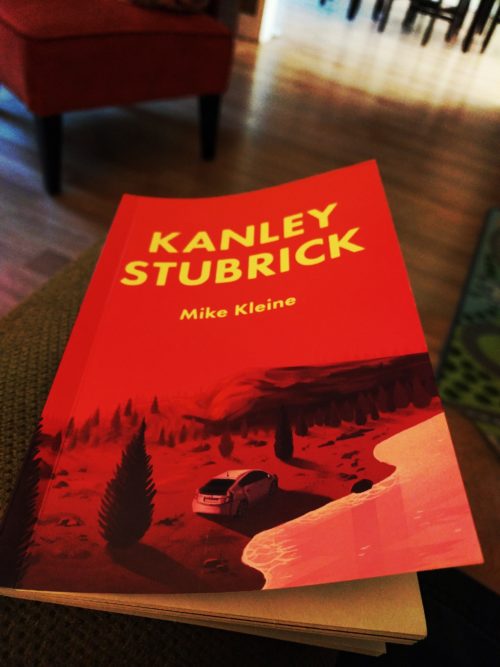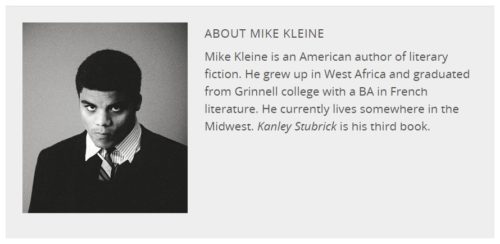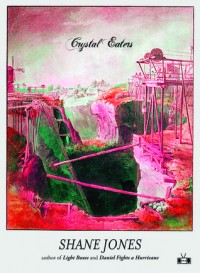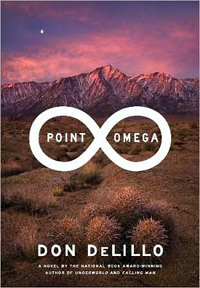“The Universe Drinks Our Blood, Man”: Notes on Mike Kleine’s Kanley Stubrick


Kanley Stubrick moves. It makes no sense and all the sense simultaneously, in the way it feels when something bad happens to you but you secretly feel like you deserved it. Or that feeling when all you wanted for breakfast was the giant banana pancake at Surrey’s Café in New Orleans on Magazine Street, but when you arrive they tell you they’re all out of the giant banana pancake batter so you get crushed and flippantly order the French toast and then it turns out the French toast is even better than the giant banana pancake but the catch is: it’s a seasonal thing and they won’t have it again for another year starting tomorrow. You know, so much of life simultaneously makes absolute sense and absolutely no sense at all. READ MORE >
October 25th, 2016 / 12:37 pm
25 Points: Crystal Eaters
 |
Crystal Eaters
by Shane Jones
Two Dollar Radio, 2014
172 pages / $16.00 buy from Two Dollar Radio or Amazon
|
0. (is) The number of fucks Shane Jones gave when he wrote Crystal Eaters.
1. Like let’s be honest. Crystal Eaters really, is Shane Jones’ giant middle finger to the publishing industry and I love it. (Like, New York City, aka: where the big book-type stuff happens). (*cough* *cough* Penguin Books *cough*).
2. I like that Crystal Eaters was released via a small indie press like Two Dollar Radio and not Penguin Books. Really. And I don’t know why.
3. That’s a lie.
4. Actually, I do know why.
5. When Shane Jones wrote that article about his shitty experience with (publishing and editing) Daniel Fights a Hurricane, I kept thinking to myself: so, for his next book, is he going to try and come up with something super-boring and ultra-generic/fake for the suits so they will sign him for another deal or is he just going to keep doing his own thing and not sell out?
6. Crystal Eaters pretty much answered my question.
7. Really, for me, the experience of reading Crystal Eaters felt a little like watching Alejandro Jodorowsky’s Holy Mountain, in the sense that it is a contemporary fable “of what social engineering caused by greed has done to the modern world, but shows us how to live and not give in to a material world.”
8. (Isn’t it weird how the IMDb synopsis for Holy Mountain just blends beautifully with/and works as a sort of faux-narrative for Crystal Eaters?)
9. The cover, I love. It’s this highly colour-fucked version of Elias Martin’s pen drawing of the Dannemora mine circa 1780-1800. (Or, at least, what I think looks like a highly colour-fucked version of Elias Martin’s pen drawing of the Dannemora mine circa 1780-1800).
10. And it’s neat to think that the art for Crystal Eaters isn’t anything custom-made (like the covers for Light Boxes and Daniel Fights a Hurricane) but something that comes from something that already existed in this world prior to Shane Jones ever even coming up with Crystal Eaters.
September 16th, 2014 / 2:30 pm
GO TO WORK AND DO YOUR JOB. CARE FOR YOUR CHILDREN. PAY YOUR BILLS. OBEY THE LAW. BUY PRODUCTS.
 GO TO WORK AND DO YOUR JOB. CARE FOR YOUR CHILDREN. PAY YOUR BILLS. OBEY THE LAW. BUY PRODUCTS.
GO TO WORK AND DO YOUR JOB. CARE FOR YOUR CHILDREN. PAY YOUR BILLS. OBEY THE LAW. BUY PRODUCTS.
by Noah Cicero
Lazy Fascist Press, 2013
188 pages / $12.95 Buy from Amazon
Noah Cicero wrote a new book in 2013.
It’s called GO TO WORK AND DO YOUR JOB. CARE FOR YOUR CHILDREN. PAY YOUR BILLS. OBEY THE LAW. BUY PRODUCTS.
But I’m going to call it GO TO WORK.
GO TO WORK is a political thriller about a man who gets a job at a prison-treatment-center called NEOTAP (you never find out what this means btw) and, pretty much, wow—after that, things start to get crazy.
It’s like: WAITING FOR GODOT meets the second season of the television series LOST meets DAVID LYNCH meets BLAIR WITCH PROJECT meets the book 1984 meets IT’S ALWAYS SUNNY IN PHILADELPHIA meets the movie CUBE meets BRAVE NEW WORLD meets SVU meets ARCHER meets the book ANTHEM meets FIREFLY meets the play NO EXIT by Jean-Paul Sartre meets THE TRIAL by Franz Kafka meets the movie WHITE LIGHTNING meets the book THE POSSESSED meets LOCK UP.
There are two main characters: Michael Scipio and Monica Whitten.
The book is told in the first-person and third-person past tense in two parts: Part One and Part Two.
Part One is Michael. First person.
“I was nervous. I was wearing a nice pair of slacks and a button-down, long-sleeved dress shirt with a tie. The tie looked great. I looked great. Everything seemed wonderful. I was a man interviewing to get a job working for the government, but I was nervous.”
Also.
“I called my parents and told them I got the job. They were excited for me. They told me to come over and they could get pizza and cake. My parents were very big into positive reinforcement. When I scored my first goal in soccer when I was seven, they bought me pizza and cake. When I was in the eighth grade talent show, playing guitar very badly, they bought me pizza and cake. When I got straight A’s on my report card, I was for sure going to get pizza and cake. Pizza and cake are the ways Americans celebrate triumphs.”
Then Part Two. Monica. Third person.
“Monica walked into NEOTAP. She went into the office and said hi to Lawrence and Imad. She didn’t know Imad and Lawrence like Mike did. She didn’t have to interact with them on a power basis. She would say hi to everyone, have small talk about sports, computers, or random life things. Everyone knew that Monica loved Arby’s and would eat Arby’s at least three times a week. Sometimes people called her Arby’s girl.”
And.
“Monica considered herself a troubleshooter. Her life was about fixing problems. Her dad had taught her the joy of solving problems. When something broke, they fixed it together. When the care broke, they fixed it together. When the roof leaked, they fixed it together. When the water heater needed to be replaced, they took it out and replaced it together.”
Semi-spoiler alert: After Part One, Michael goes missing—disappears—and Monica becomes the main character because she decides she needs to find out what happened to Michael.
Kind of interesting.
The book is set in 2011 and it’s about what it means—what it’s like—to live in the real world. In America. The United States. Right now. It’s about being young. About needing to find a job. About finding that job. About needing that job so you can have access to healthcare. About falling in love. About betrayal. About deception. Needing healthcare. About following orders. About forgetting what you’re supposed to be doing sometimes. About feeling like you need healthcare real bad. About wondering if what you are doing is the right thing. About meeting people’s parents for the first time. Healthcare. About doing something crazy because maybe you think you are in love. About taking prescription drugs because they make you feel good. H-E-A-L-T-H-C-A-R-E. And about disappearing too.
It’s a lot about disappearing.
In the chapter ‘Under a Bed,’ a NEOTAP resident, who is Mexican, disappears, and no one seems to care.
“I went to Imad’s office and closed the door. I said to Imad, ‘Armando disappeared.’
Imad looked at me. He didn’t have a facial expression. He listened like I was explaining something that didn’t matter to him.
Finally, he said, ‘Okay, I’ll fix it.’
I left the office. Armando disappeared and no one cared. I saw Imad leave his office and walk to Heidelberg’s office. No one rushed around. Everyone moved without purpose, without a sense of urgency. A human had disappeared and no one cared. What kind of job did I have?”
GO TO WORK is a departure, basically, from everything [else] Noah Cicero out there. It’s got, like, a plot. And two main characters.
Remember: this is a political thriller by a guy who is known for writing alt lit!
There are so many beautiful characters and so many different layers to everything and so many cool things that happen; and so much super-philosophical stuff about life—it’s everything you love and know about Noah Cicero and the way he writes.
But GO TO WORK is also a very scary book. Or, I guess, if you want to look at it as something that can be scary—it’s scary. Noah Cicero discusses several important real-world issues. He looks at how things right now have changed from how they were in the recent past (and the ancient past). How things right now are probably going to become very bad very soon. How things are probably not going in the right direction for the world and the environment and the people in the world. How there are some people, right now, out there in the world, who are willing to do whatever it takes, basically, to change the world. And others, who want to keep the world the way it is, no matter what, at any cost. Noah Cicero also looks at how sometimes, where you work, you may not like where you work. How sometimes, you really don’t know what’s going to happen in the end. And how really, the world is just a scary place to be.
All these themes are pretty much classic Noah Cicero.
On Facebook, Noah Cicero said it might take 6 hours to read GO TO WORK. I agree. GO TO WORK—you could read all in one sitting. And everything is written in that very-easy-to-follow Noah Cicero prose.
“Criminal Thought #1. I want to get a woman pregnant. I will find the fattest stupidest woman I can find. I don’t care what race she is, probably white. If you have been to prison, fat white girls are easy. All you gotta do is show them some prison tats and a fat white trash girl will fuck you. I will get the nastiest woman I can find. A woman I know for sure will not be responsible for the child. She won’t even talk to the child, she won’t even take the child to the park… she will scam the government out of every dollar she can… I won’t pay child support. I will do lots of drugs and never see my kid. It will be really funny.”
January 10th, 2014 / 10:00 am
25 Points: Fjords Vol. 1
 Fjords Vol. 1
Fjords Vol. 1
by Zachary Schomburg
Black Ocean, 2012
72 pages / $14.95 buy from Black Ocean
1. Fjords Vol. 1 is something I could have read in a few hours—easy.
2. It took me 17 days to read Fjords Vol. 1 all the way thru.
3. Fjords Vol. 1 is 57 pages.
4. I have been fascinated/infatuated by Zachary Schomburg-stuff for quite some time. I sent him an email once but he never replied. I assume this is because he was too busy writing awesome fucking poetry.
5. If I wrote awesome fucking poetry like Zachary Schomburg, I probably wouldn’t have the time to reply to emails from people I have never met IRL.
6. It’s not very hard to read Fjords Vol. 1, which is nice. But it’s also not meant to be very hard, I don’t think. It’s like something that is easy to learn but hard to master. Like chess, for example. Or swimming. The Tecktonik dance. I don’t know. (But) that’s how I feel about Zachary Schomburg poetry.
7. If Fjords Vol. 1 had been a homework assignment in high school, I would have found it to be very easy. You could definitely read it all in one night/sitting (if you really wanted to, and I sort of allude to this already).
8. But there is so much to understand and feel and grasp and learn and write down and think about—which is why I love Fjords Vol. 1 so much.
9. Like the poem Staring Problem, in its entirety. “A woman walks into a room. I am in a different room. What has happened to your eyes? she asks.”
10. I feel like, maybe, sometimes, Zachary Schomburg is too smart for me to understand—but I generally feel like this about all poetry—so I keep reading the same line over and over, because I keep thinking “No, this is not hard. I am making it hard. I am pretty sure I can understand anything,” and even after several re-readings (now)—I still cannot grasp everything there is to grasp in the book. That’s fine though. And this is not a bad cannot-grasp-everything. This is a good cannot-grasp-everything. A book that is challenging (to/for) me. Something I can come back to, later in life, after I have read more books and feel like I can finally maybe understand things better. READ MORE >
February 26th, 2013 / 12:09 pm
Point Omega

Point Omega
by Don DeLillo
Scribner, 2010
First Edition: 117 pages / Paperback Reprint: 128 pages; $12 Buy from Amazon
Sometimes, things are just complicated… A lot of Point Omega, or, a good portion of the book, I feel I did not understand. Sure, I’ve only read it once, so I guess I sort of expected this, but at the same time, I quickly realized that this was a different sort of “I did not understand.”
Basically, Point Omega was challenging. I paid attention to what was being said (for the most part) and yes, I even took notes, but still, I don’t think I get Point Omega, or, I don’t think I get all of Point Omega. But this is a good thing because I like how I am feeling right now: dumb, confused and (for some reason) mediocre/inferior—all at the same time. Of course, this is (still) my (initial) reaction to Point Omega, since I have only read it once (though I’m not sure I will be reading it again anytime soon) but this, in general, is a new type of feeling for me. It’s a feeling of deep-rooted confusion, weakness and extreme anxiousness. Usually, I’m more into books that make me feel powerful and strong and happy but, sometimes, I guess I like the mind-fucks too. And I’d like to think I am able to understand most things, and conceptually, I (think I) understood most of what was going on in Point Omega but also, not really. But that’s the point I think! Let’s develop this.
The way I see it: Point Omega is about the things that are around us, and (then, also,) the things that aren’t. Or, the things that we can see and then, the things we cannot.
For example, here is how the book opens, more or less:
October 19th, 2012 / 12:00 pm
